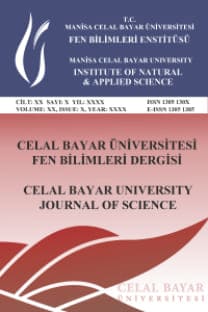Geometric Characterization of Three-Dimensional (3D) Woven Jute Fiber Preforms for Composites
Geometric characterization, Jute fiber, Natural fiber composites Three dimensional (3D) woven preform,
___
- 1. Stig, F, Hallström, S. 2012. Spatial modelling of 3D-woven textiles. Composite Structures; 94(5): 1495–1502.
- 2. Ko, F. 3-D textile reinforcements in composite materials. In: Miravete A (ed) 3-D textile reinforcements in composite materials. Woodhead Publishing, Cambridge, 1999, pp 9–42.
- 3. Mohanty, AK, Misra, M, Drzal, LT. Natural fibers, biopolymers, and biocomposites: An introduction. In: Mohanty A, Misra M, Drzal LT (eds) Natural fiber, biopolymer, and biocomposites. CRC Press, Boca Raton, 2005, pp 1–36.
- 4. Aziz, SH, Ansell, MP. Optimising the properties of green composites. In: Baillie C (ed) Green composites: Polymer composites and the environment. Woodhead Publishing, Boca Raton, 2004, pp 154–180.
- 5. Satyanarayana, KG, Arizaga, GGC, Wypych, F. 2009. Biodegradable composites based on lignocellulosic fibers–An overview. Progress in Polymer Science; 34(9): 982–1021.
- 6. Mohanty, AK, Misra, M, Hinrichsen, G. 2000. Biofibres, biodegradable polymers and biocomposites: An overview. Macromolecular Materials and Engineering; 276–277(1): 1–24.
- 7. Bismarck, A, Mishra, S, Lampke, T. Plant fibers as reinforcement for green composites. In: Mohanty A, Misra M, Drzal LT (eds) Natural fibers, biopolymers, and biocomposites. CRC Press, Boca Raton, 2005, pp 37-108.
- 8. Wambua, P, Ivens, J, Verpoest, I. 2003. Natural fibres: Can they replace glass in fibre reinforced plastics? Composites Science and Technology; 63(9): 1259–1264.
- 9. Joshi, SV, Drzal, LT, Mohanty, AK, Arora, S. 2004. Are natural fiber composites environmentally superior to glass fiber reinforced composites? Composites Part A: Applied Science and Manufacturing; 35(3): 371–376.
- 10. Mehta, G, Mohanty, AK, Thayer, K, Misra, M, Drzal, LT. 2005. Novel biocomposites sheet molding compounds for low cost housing panel applications. Journal of Polymers and the Environment; 13: 169–175.
- 11. Bledzki, AK, Faruk, O, Sperber, VE. Cars from bio-fibres. 2006. Macromolecular Materials and Engineering; 291(5): 449–457.
- 12. Bilisik, K, Karaduman, NS, Bilisik, NE, Bilisik, HE. 2013. Three-dimensional fully interlaced woven preforms for composites. Textile Research Journal; 83(19): 2060-2084.
- 13. Potluri, P, Sharif, T, Jetavat, D. 2008. Robotic approach to textile preforming for composites. Indian Journal of Fibre & Textile Research; 33: 333-338.
- ISSN: 1305-130X
- Yayın Aralığı: 4
- Başlangıç: 2005
- Yayıncı: Manisa Celal Bayar Üniversitesi Fen Bilimleri Enstitüsü
Positioning of Cubic Shaped Particles with Different Edge Structures in Nematic Medium
Comparison of Cellular Autofluorescence Patterns of Two Model Microalgae by Flow Cytometry
Frame Detection with Deep Learning
Mete Yıldırım, Radosveta İvanova Sokullu
Waleed FADEL, Ulaş KILIÇ, Sezai TAŞKIN
Mehmet SEZER, Kübra ERDEM BİÇER, Mustafa KAZAZ
Optimal placement of multiple DGs in radial distribution systems to minimize power loss using BSA
Sezai Taşkın, Waleed Fade, Ulaş Kılıç
A Novel Donor-π-Acceptor Type Sensitizer for Dye Sensitized Photochemical Hydrogen Generation
Geometric Characterization of Three-Dimensional (3D) Woven Jute Fiber Preforms for Composites
